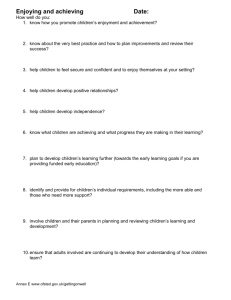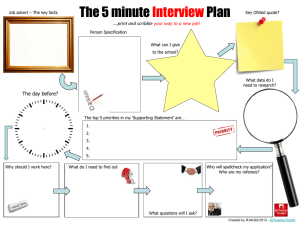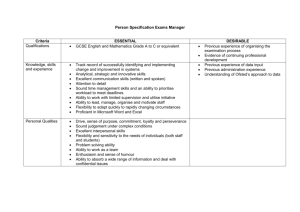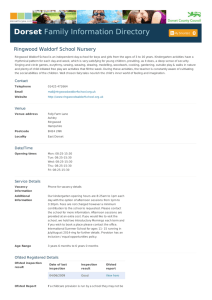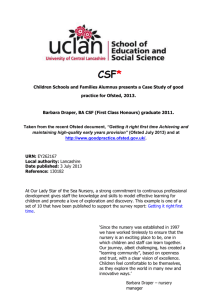Eve Field Parent Engagement
advertisement
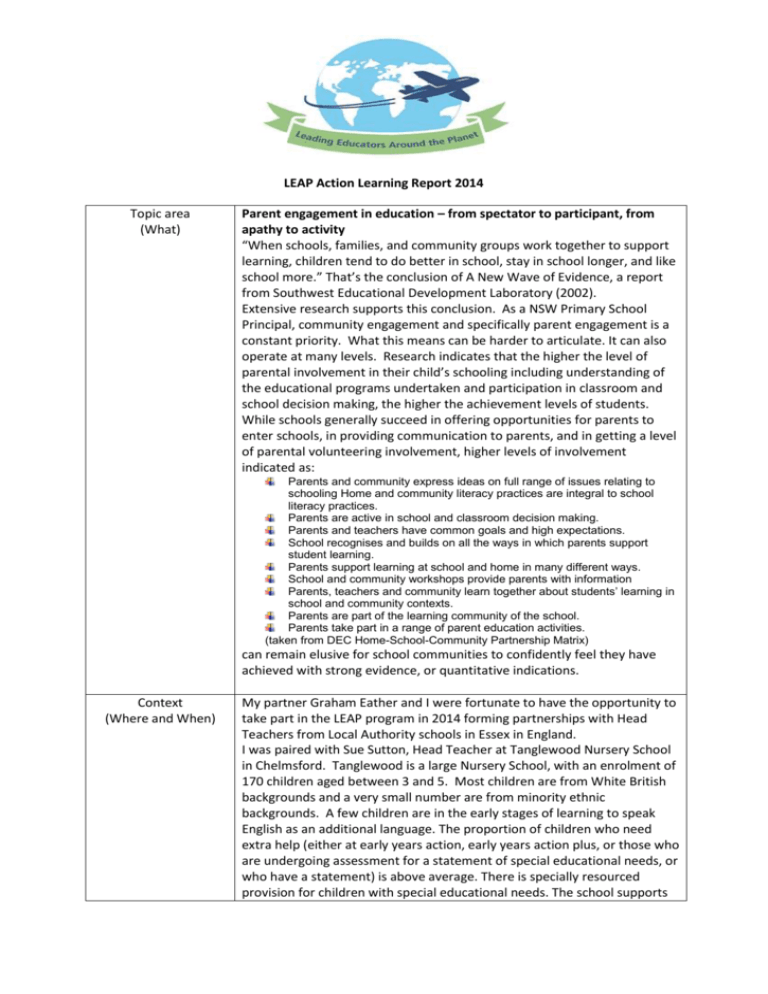
LEAP Action Learning Report 2014 Topic area (What) Parent engagement in education – from spectator to participant, from apathy to activity “When schools, families, and community groups work together to support learning, children tend to do better in school, stay in school longer, and like school more.” That’s the conclusion of A New Wave of Evidence, a report from Southwest Educational Development Laboratory (2002). Extensive research supports this conclusion. As a NSW Primary School Principal, community engagement and specifically parent engagement is a constant priority. What this means can be harder to articulate. It can also operate at many levels. Research indicates that the higher the level of parental involvement in their child’s schooling including understanding of the educational programs undertaken and participation in classroom and school decision making, the higher the achievement levels of students. While schools generally succeed in offering opportunities for parents to enter schools, in providing communication to parents, and in getting a level of parental volunteering involvement, higher levels of involvement indicated as: Parents and community express ideas on full range of issues relating to schooling Home and community literacy practices are integral to school literacy practices. Parents are active in school and classroom decision making. Parents and teachers have common goals and high expectations. School recognises and builds on all the ways in which parents support student learning. Parents support learning at school and home in many different ways. School and community workshops provide parents with information Parents, teachers and community learn together about students’ learning in school and community contexts. Parents are part of the learning community of the school. Parents take part in a range of parent education activities. (taken from DEC Home-School-Community Partnership Matrix) can remain elusive for school communities to confidently feel they have achieved with strong evidence, or quantitative indications. Context (Where and When) My partner Graham Eather and I were fortunate to have the opportunity to take part in the LEAP program in 2014 forming partnerships with Head Teachers from Local Authority schools in Essex in England. I was paired with Sue Sutton, Head Teacher at Tanglewood Nursery School in Chelmsford. Tanglewood is a large Nursery School, with an enrolment of 170 children aged between 3 and 5. Most children are from White British backgrounds and a very small number are from minority ethnic backgrounds. A few children are in the early stages of learning to speak English as an additional language. The proportion of children who need extra help (either at early years action, early years action plus, or those who are undergoing assessment for a statement of special educational needs, or who have a statement) is above average. There is specially resourced provision for children with special educational needs. The school supports up to 16 children who have identified speech and language difficulties. They receive extra language support and help, along with their daily nursery experience. After Sue had stayed with us in July 2014, Graham and I stayed with Sue in September. I had advised Sue of my topic area, and she had arranged for me to discuss programs and practices related to this at her school, and at other local schools. It was of interest to see what levels of parental engagement were being met in UK schools, and where high levels were achieved, what were the key factors in enabling a high level of engagement, such as would meet the indicators listed above. From Sue’s visit to us, and from interactions with Head Teachers in England, it was evident of the high level of impact that Ofsted inspections had on schools. Ofsted is the Office for Standards in Education, Children’s Services and Skills, which inspects and regulates services that care for children and young people, and services providing education and skills for learners of all ages. Sue in fact had her inspection while I was visiting her. This has caused me look at Ofsted standards in line with my research into parental engagement in England. Research methods (How) Findings (So what) Pre and post readings on parental engagement Interviews with staff at Tanglewood Nursery School, Writtle Junior School, Lawford Mead Junior School Documentation describing school programs Ofsted school inspection reports Ofsted parent view School Evaluation checklists While further researching into parental engagement post LEAP, I came across the work of Joyce Epstein (et al) of John Hopkins University. Joyce Epstein has identified 6 levels of parental involvement in schools in her work. These are: 1. PARENTING: Help all families establish home environments to support children as students • Parent education and other courses or training for parents (e.g., GED, college credit, family literacy). • Family support programs to assist families with health, nutrition, and other services. • Home visits at transition points to pre-school, elementary, middle, and high school. 2. COMMUNICATING: Design effective forms of school-to-home and home-to-school communications about school programs and children's progress. • Conferences with every parent at least once a year. • Language translators to assist families as needed. • Regular schedule of useful notices, memos, phone calls, newsletters, and other communications. 3. VOLUNTEERING: Recruit and organize parent help and support. • School and classroom volunteer program to help teachers, administrators, students, and other parents. • Parent room or family centre for volunteer work, meetings, resources for families. • Annual postcard survey to identify all available talents, times, and locations of volunteers. 4. LEARNING AT HOME: Provide information and ideas to families about how to help students at home with homework and other curriculumrelated activities, decisions, and planning. • Information for families on skills required for students in all subjects at each grade. • Information on homework policies and how to monitor and discuss schoolwork at home. • Family participation in setting student goals each year and in planning for college or work. 5. DECISION MAKING: Include parents in school decisions, developing parent leaders and representatives. • Active PTA/PTO or other parent organizations, advisory councils, or committees for parent leadership and participation. • Independent advocacy groups to lobby and work for school reform and improvements. • Networks to link all families with parent representatives. 6. COLLABORATING WITH COMMUNITY: Identify and integrate resources and services from the community to strengthen school programs, family practices, and student learning and development. • Information for students and families on community health, cultural, recreational, social support, and other programs or services. • Information on community activities that link to learning skills and talents, including summer programs for students. • Service to the community by students, families, and schools (e.g. recycling, art, music, drama, and other activities for seniors or others). These levels and explanations gave an interesting basis for looking at the work being done in schools around parental involvement. A major aspect of schooling systems in the UK are Ofsted inspections. These involve external inspections of children’s services and educational institutions, currently giving ratings from Outstanding to Special measures in the following areas: Leadership and management Behaviour and safety of pupils Quality of teaching Achievement of pupils Part of an inspection is an opportunity for parent view, in which parents give their views of the school in these 12 areas. My child is happy at this school My child feels safe at this school My child makes good progress at this school My child is well looked after at this school My child is taught well at this school My child receives appropriate homework for their age The school makes sure its pupils are well behaved The school deals effectively with bullying The school is well lead and well managed The school responds well to any concerns I raise I receive valuable information from the school about my child’s progress Would you recommend this school to another parent? Attention to parental involvement to the levels described by Joyce Epstein is loosely but not specifically targeted by these questions. The focus here is about how and what a school communicates to the parents, and about the degree of confidence and satisfaction in a school’s ability to educate their child and keep them safe and happy rather than how the school is engaging parents in their children’s education. It is interesting that given acknowledged importance of parental involvement, it is not a focus for school evaluation in the Ofsted report. In discussions with the Deputy Head at Tanglewood Nursery School, the school offered courses for parents each year, with a good take-up. The 2014 Ofsted report states that “ Parents value the work of the school. One parent spoke for many when she said about bringing her second child to start at school, 'It feels like coming back home again. Parents say that the workshops the school provides for them encourage them to continue to help their children to learn at home.” When weighed against Epstein’s levels, this statement indicates a school doing well across several levels of parental involvement, although this was not a prime focus of the Ofsted report. During a visit to Lawson Mead Junior School I met with a Community Liaison officer and an Executive teacher who together facilitate a parenting course called the Incredible Years. They also run a student behaviour program for students called Dinosaur school. Ideally parents of students in Dinosaur School access the Incredible Years as well, but there is not an essential link between the programs. Feedback from participants in the most recent Incredible Years course indicated a high level of impact from the program. The staff members interviewed are not able to identify parenting programs related to informing parents about how to support their children’s learning. A third school visit was to Writtle Junior School. The Head Teacher Nick Taylor was very proud of his school, and it was very pleasant to be there. The 2013 Ofsted report saw the school go from requires improvement to an assessment of Good. Parent View for the inspection was very positive, based on the 12 questions asked. No mention of parent involvement and programs was mentioned in the report. In discussion with the Head Teacher, focus on communicating and effectively reporting to parents had been high. Parent inclusion in extra-curricular programs was sought, and he was happy with the level achieved. This brief overview of parental engagement in a small number of schools in England, and the focus of Ofsted inspections can be reviewed against Epstein’s levels. Decision making seems limited to the feedback given in self evaluations and in particular Ofsted parent view, although this would be appropriate for further investigation. Schools in England have Governing bodies, but these do not include parents from the school itself. I would suggest from my observations that the schools offered collaboration with the community in a number of ways, although again this is not specifically targeted by Ofsted. A correlation that can be draw looking at Ofsted reports is that positive parent view links with good or outstanding gradings in the four areas examined. Does this mean that a school will be well perceived by its parent community if they feel the school offers good teaching that supports children’s progress, that they are informed correctly on that progress, that their children are safe in their school, and that parent concerns are dealt with in a satisfactory way? Ultimately, is this of more concern and interest to most parents than being actively involved in decision making or learning programs in the school? Hattie identifies parental involvement as having an effect size of .51, which makes it of impact. However this effect size is below that of formulative evaluation (.91), classroom behaviour (.8), teacher clarity (.75) feedback (.73) and teacher-student relationships (.72), which have alignment with the focus of Ofsted. The recently released Public Schools NSW School Excellence Framework has 14 elements for an excellent school across the areas of excellence in learning, excellence in teaching and excellence in leading. Across these elements the relationship within school communities, parent understanding and engagement in the learning progress of students and collaboration with stake holders in developing school direction are clear expectations for an excellent school. While there is more detail that could be looked at around parent involvement across the English system, the research I have done leads me to the following findings: Parent satisfaction is most effectively gained by the progress, safety and happiness of their children within a school. School commitment to success in these areas will inform positive relationships between parents and schools. Parent involvement has a very positive effect size on student achievement Actions and strategies by schools that develop the relationships between home and school are seen as contributing to school excellence in Public Schools NSW. The Epstein levels of involvement provide a useful guide to what schools might do, and the schools visited in English offer programs and have strategies to work across the levels without it being specifically addressed Personally I am left feeling that a school can do a good job of maintaining parental involvement for most parents by ensuring communication gives honest reassurance that their children are looked after and making progress in the school. I am still interested in exploring how to extend that communication to all parents especially those that have had reason to be withdrawn from schools as institutions earlier in life. As a Principal I want to be confident that the school is delivering in a way that should satisfy the 12 Ofsted Parent view questions, but ideally I would like to be confident that every child had parental interest in their education for the benefit of their child, and this is why the topic of Parent engagement in education – from spectator to participant, from apathy to activity remains a high focus for me as an educator . Name:Eve Field School/work place: Kurri Kurri Public School Contacts Email: eve.field1@det.nsw.edu.au Phone: 0416042294 G
